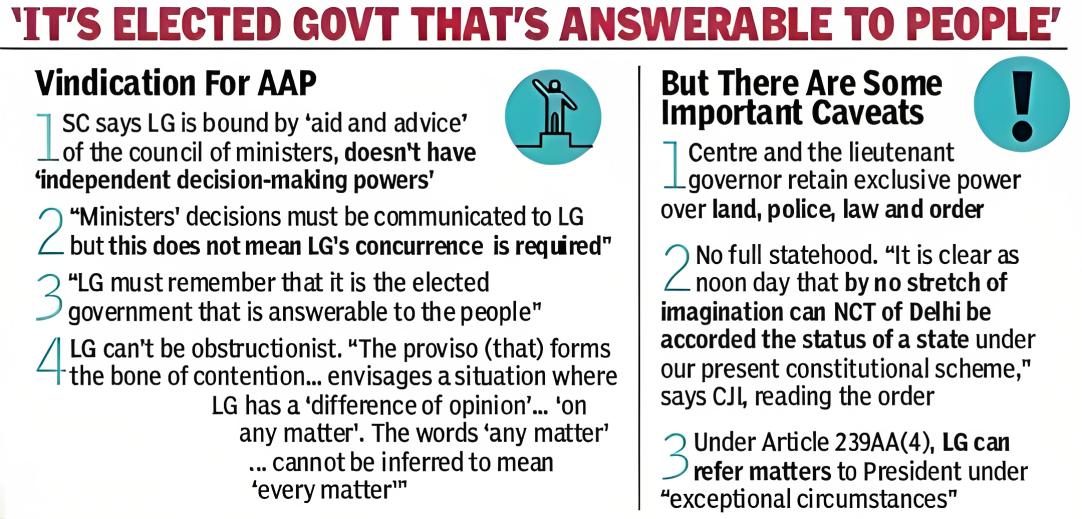Description

Copyright infringement not intended
Context: The recent ordinance issued by the Centre on the control of services in Delhi has sparked controversy and raised questions about the constitutional status of the national capital.
Details
- The ordinance, which was promulgated on May 19, 2023, effectively nullifies the Supreme Court verdict that had given the power of transfer and posting of bureaucrats to the elected Delhi government.
- The ordinance designates the Lieutenant-Governor (L-G) as the administrator of Delhi, with the final say on the postings and transfer of all bureaucrats serving the Delhi government.
Creates a new Statutory Body
Composition
- The ordinance creates a new statutory body called the National Capital Civil Service Authority (NCCSA), which will consist of;
- The Chief Minister
- The Chief Secretary
- The Principal Secretary (Home) of Delhi.
Function
- The NCCSA will make recommendations to the L-G regarding matters concerning transfer, posting, vigilance and other incidental matters of all Group A officials and officers of Delhi, Andaman and Nicobar Island Civil Service (DANICS) serving in the affairs of the Delhi government.
- However, the L-G can reject or return the recommendations of the NCCSA, and in case of a dispute, his decision will be final.

Arguments by the Centre
- The Centre has defended the ordinance as a necessary measure to ensure administrative balance and harmony in Delhi.
- They argued that the ordinance is in line with Article 239AA of the Constitution, which gives special status to Delhi as a Union Territory with a legislative assembly.
- They cited Article 239AB, which empowers the President to suspend or modify any provision relating to Delhi in case of a failure of constitutional machinery.
Criticism
- The ordinance has been widely criticised by the Delhi Government, as an attempt to undermine its authority and autonomy.
- The State Government has accused the Centre of violating the constitutional principles of democracy and federalism and showing contempt for the Supreme Court's judgment.
- They also claimed that the ordinance will hamper the effective functioning and delivery of services by the Delhi government.
Conclusion
- The ordinance has once again brought to light the complex and contentious issue of governance in Delhi, which has been a bone of contention since 2015. The ordinance has also raised concerns about its legality and constitutionality, as it seems to go against the spirit and letter of the Supreme Court's verdict. The ordinance may face legal challenges in the future, as it affects the rights and interests of not only the elected representatives but also the people of Delhi.
Must Read Articles:
Supreme Court Verdict on Control over Services: https://www.iasgyan.in/daily-current-affairs/supreme-court-verdict-on-control-over-services
|
PRACTICE QUESTION
Q. How to address the conflict between the elected government and the nominated head in Union Territories (UTs)? This conflict poses significant challenges to democracy, stability and development, as well as to the legitimacy and accountability of both institutions. What are some possible ways forward to resolve this conflict and enhance cooperation and trust between the elected and nominated authorities?
|

https://epaper.thehindu.com/ccidist-ws/th/th_delhi/issues/36860/OPS/G4MB8JAQK.1+G3RB8K2L2.1.html











